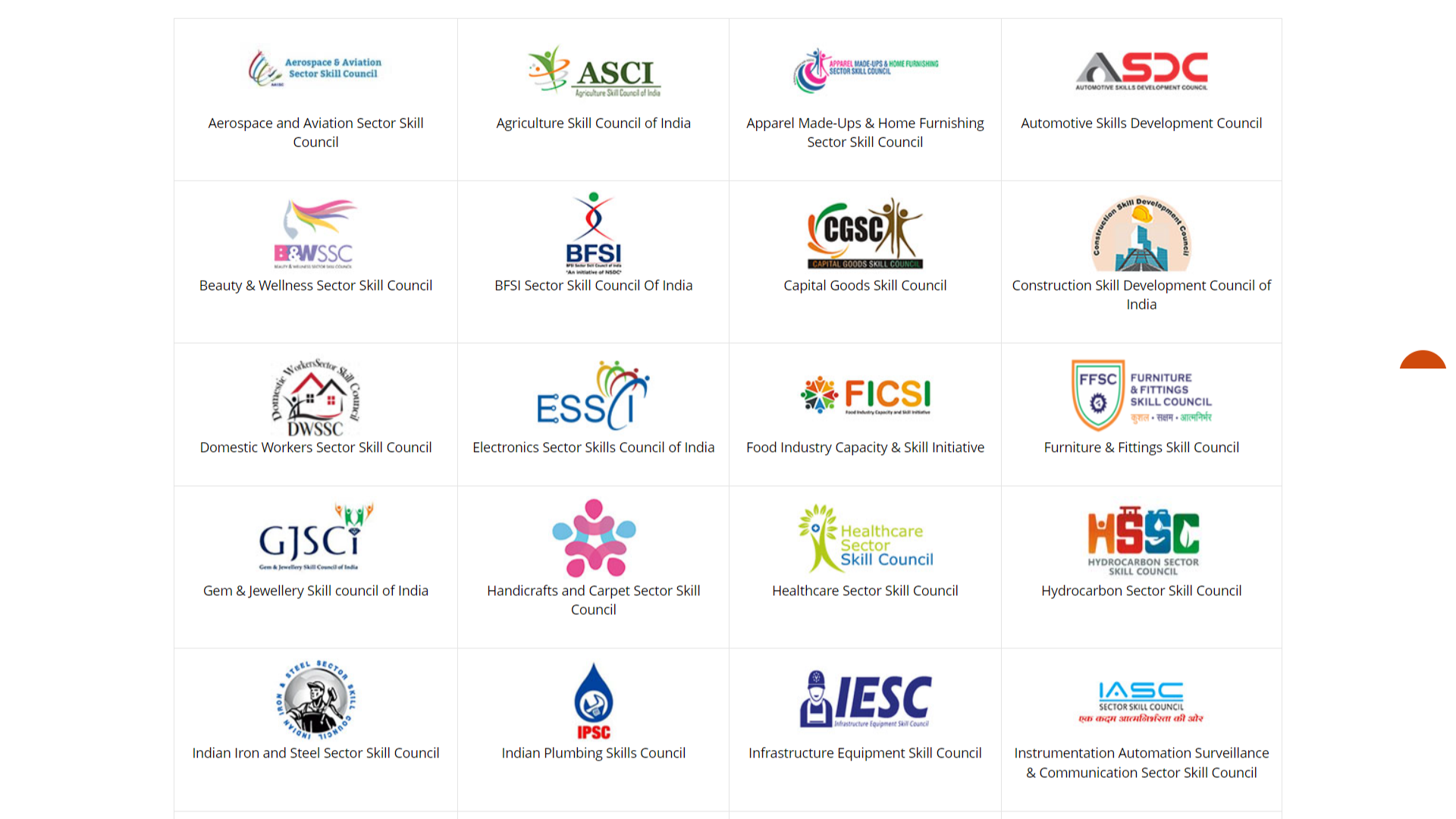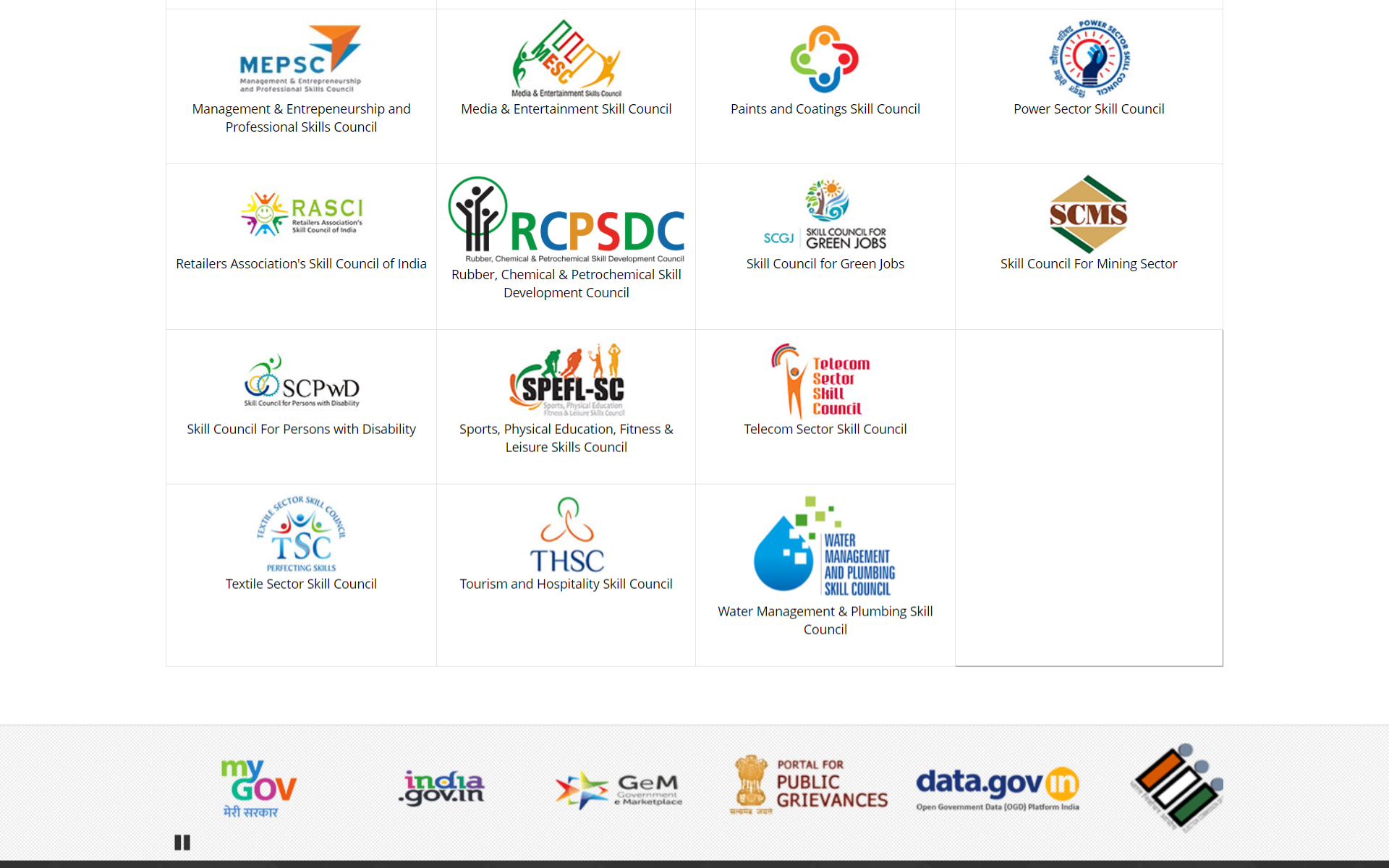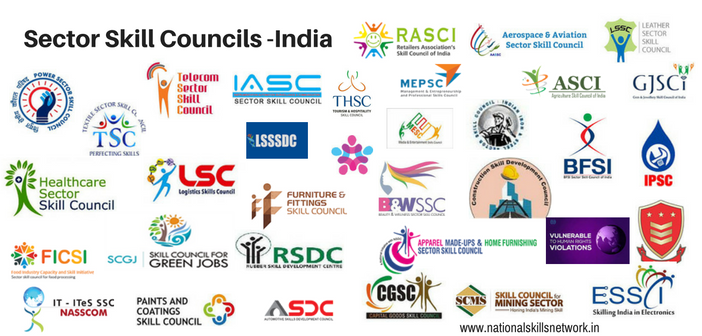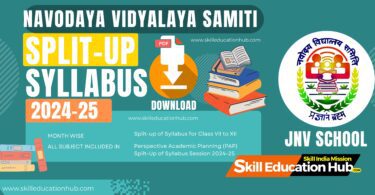Sector Skill Councils are set up as autonomous industry-led bodies by NSDC. They create Occupational Standards and Qualification bodies, develop competency framework, conduct Train the Trainer Programs, conduct skill gap studies and Assess and Certify trainees on the curriculum aligned to National Occupational Standards developed by them.

There are currently 37 Sector Skill Councils are operational. There are over 600 Corporate Representatives in the Governing Councils of these SSCs.
Sector Skill Councils in PMKVY: Bridging the Skill Gap
In today’s rapidly evolving job market, the need for skilled professionals is more crucial than ever. To address this demand and equip individuals with industry-relevant skills, the Indian Government launched the Pradhan Mantri Kaushal Vikas Yojana (PMKVY). PMKVY, launched in 2015, aims to provide skill development training to the youth across various sectors, thereby enabling them to find better employment opportunities. One of the key components of PMKVY is the establishment of Sector Skill Councils (SSCs). Let’s delve deeper into the significance and role of these councils in the skill development landscape.

Sector Skill Councils: An Overview
Sector Skill Councils (SSCs) are industry-led bodies that play a crucial role in bridging the skill gap between the supply and demand of skilled workforce in a particular sector. These councils act as facilitators, collaborators, and coordinators, ensuring that the skill training programs align with industry requirements.
Role of Sector Skill Councils
SSCs are responsible for several essential functions that contribute to the success of PMKVY. Let’s explore these roles in detail:
1. Identification of Skill Gaps
One of the primary responsibilities of SSCs is to identify existing and emerging skill gaps within their respective sectors. By conducting comprehensive industry surveys and engagement with stakeholders, they gather valuable insights into the skills required by employers. This information acts as a foundational basis for designing skill development programs.
2. Development of Qualification Packs (QPs) and National Occupational Standards (NOS)
SSCs, in collaboration with industry experts and stakeholders, develop Qualification Packs (QPs) and National Occupational Standards (NOS) for various job roles. QPs define the essential skills and competencies required for a particular job role, while NOS specify the standard of performance expected from individuals working in those roles.
These standards ensure that the skill training programs are relevant, industry-oriented, and meet the requirements of different job roles within a sector.
3. Accreditation of Training Providers
To ensure the quality of skill training programs, SSCs play a crucial role in accrediting and empanelling training providers. They establish stringent criteria and guidelines for accreditation, ensuring that only competent and reliable institutions and trainers are entrusted with the responsibility of imparting skill training.
The accreditation process significantly enhances the credibility and standardization of the training programs offered under PMKVY.
4. Monitoring and Evaluation of Skill Training Programs
SSCs actively monitor the implementation of skill training programs and ensure that they are executed as per the defined standards. They conduct regular assessments and evaluations to gauge the effectiveness of the training programs and identify areas for improvement.
By maintaining strict quality control measures, SSCs ensure that the skill training provided under PMKVY is of a high standard and meets the industry’s requirements.

Benefits of Sector Skill Councils
The establishment of Sector Skill Councils under PMKVY has brought forth numerous benefits for stakeholders involved. Let’s explore some of these advantages:
1. Industry-relevant Training
By actively involving industry experts in the process of curriculum development, SSCs ensure that the skill training programs are aligned with industry requirements. This, in turn, enhances the employability of individuals and enables them to meet the evolving needs of the job market.
2. Improved Job Prospects
Through strategic collaboration with employers, SSCs bridge the skill gap and equip individuals with the necessary competencies that match the demands of the industry. This, in turn, increases the chances of individuals securing better employment opportunities and achieving career growth.
3. Quality Assurance
SSCs act as custodians of quality in skill development programs. By ensuring accreditation of training providers and maintaining rigorous monitoring systems, they upgrade the overall standard of skill training. This leads to increased trust among employers and enhances the credibility of the certified individuals.
4. Enhanced Productivity
By providing industry-specific training, SSCs contribute to improved productivity within sectors. Skilled individuals are more equipped to handle the demands of their job roles, resulting in increased output, efficiency, and innovation within organizations.
The Ministry has been actively engaging with these SSCs.
| Sector Skill Council (SSC) | Description |
|---|---|
| Aerospace and Aviation Sector Skill Council (AASSC) | Focuses on skill development in the aerospace and aviation industry, including aircraft manufacturing, maintenance, and related services. |
| Agriculture Skill Council of India (ASCI) | Aims to enhance skills and productivity in the agriculture sector, covering farming techniques, agribusiness management, and allied activities. |
| Apparel Made-Ups & Home Furnishing Sector Skill Council (AMHSSC) | Focuses on skill development in the apparel, textile, and home furnishing industries, including garment manufacturing, design, and retail. |
| Automotive Skills Development Council (ASDC) | Works towards developing skilled manpower for the automotive sector, encompassing vehicle manufacturing, repair, and maintenance. |
| Beauty & Wellness Sector Skill Council (BWSSC) | Facilitates skill development in the beauty and wellness industry, covering various services such as skincare, haircare, spa therapies, and beauty retail. |
| BFSI Sector Skill Council of India (BFSISSC) | Concentrates on skill development in the banking, financial services, and insurance sectors, including banking operations, financial planning, and insurance sales. |
| Capital Goods Skill Council (CGSC) | Focuses on skill development in the capital goods industry, including machinery manufacturing, equipment installation, and maintenance. |
| Construction Skill Development Council of India (CSDCI) | Works towards enhancing skills in the construction sector, covering building construction, infrastructure development, and allied trades. |
| Domestic Workers Sector Skill Council (DWSSC) | Aims to improve the skills and working conditions of domestic workers through training and certification programs. |
| Electronics Sector Skills Council of India (ESSCI) | Focuses on skill development in the electronics and IT hardware industry, including electronics manufacturing, assembly, and repair. |
| Food Industry Capacity & Skill Initiative (FICSI) | Facilitates skill development in the food processing industry, covering food production, processing, packaging, and quality assurance. |
| Furniture & Fittings Skill Council (FFSC) | Focuses on skill development in the furniture manufacturing and woodworking industry, including carpentry, furniture design, and upholstery. |
| Gem & Jewellery Skill Council of India (GJSCI) | Aims to enhance skills in the gem and jewelry industry, covering gemstone cutting, jewelry design, manufacturing, and retail. |
| Handicrafts and Carpet Sector Skill Council (HCSSC) | Works towards skill development in the handicrafts and carpet weaving industry, preserving traditional crafts and promoting artisanal skills. |
| Healthcare Sector Skill Council (HSSC) | Focuses on skill development in the healthcare industry, covering various roles such as nursing, medical laboratory technology, and patient care. |
| Hydrocarbon Sector Skill Council (HSSC) | Aims to develop skilled manpower for the hydrocarbon sector, including oil and gas exploration, production, refining, and distribution. |
| Indian Iron and Steel Sector Skill Council (IISSSC) | Focuses on skill development in the iron and steel industry, covering steel production, metallurgy, and material handling. |
| Indian Plumbing Skills Council (IPSSC) | Facilitates skill development in the plumbing and sanitation industry, covering plumbing installation, maintenance, and water conservation techniques. |
| Infrastructure Equipment Skill Council (IESC) | Works towards skill development in the infrastructure equipment industry, including heavy machinery operation, maintenance, and safety. |
| Instrumentation Automation Surveillance & Communication Sector Skill Council (IASC) | Focuses on skill development in instrumentation, automation, surveillance, and communication technologies across various industries. |
| IT-ITeS Sector Skill Council (SSC NASSCOM) | Concentrates on skill development in the IT and IT-enabled services industry, covering software development, IT support, and business process outsourcing. |
| Leather Sector Skill Council (LSSC) | Aims to enhance skills in the leather and leather goods industry, covering leather processing, footwear manufacturing, and leather product design. |
| Life Sciences Sector Skill Development Council (LSSSDC) | Focuses on skill development in the life sciences industry, covering pharmaceuticals, biotechnology, and clinical research. |
| Logistics Sector Skill Council (LSC) | Works towards skill development in the logistics and supply chain management industry, covering transportation, warehousing, and inventory management. |
| Management & Entrepreneurship and Professional Skill Council (MEPSC) | Facilitates skill development in management, entrepreneurship, and professional services, including business management, consulting, and digital marketing. |
| Media & Entertainment Skill Council (MESC) | Focuses on skill development in the media and entertainment industry, covering film production, animation, broadcasting, and digital media. |
| Paints and Coatings Skill Council (PCSC) | Aims to enhance skills in the paints and coatings industry, covering paint manufacturing, application techniques, and surface preparation. |
| Power Sector Skill Council (PSSC) | Works towards skill development in the power generation, transmission, and distribution industry, covering electrical engineering, renewable energy, and power plant operations. |
| Retailers Association’s Skill Council of India (RASCI) | Concentrates on skill development in the retail industry, covering retail operations, sales, merchandising, and customer service. |
| Rubber Skill Development Council (RSDC) | Aims to enhance skills in the rubber industry, covering rubber processing, product manufacturing, and quality control. |
| Skill Council for Green Jobs (SCGJ) | Focuses on skill development in the renewable energy and environmental sustainability sectors, including solar energy, wind power, and waste management. |
| Skill Council for Mining Sector (SCMS) | Works towards skill development in the mining and mineral processing industry, covering mining operations, mineral exploration, and mine safety. |
| Skill Council for Persons with Disability (SCPwD) | Aims to enhance skills and employment opportunities for persons with disabilities through tailored skill development programs. |
| Sports, Physical Education, Fitness & Leisure Skills Council (SPEFL-SC) | Focuses on skill development in the sports, fitness, and leisure industry, covering sports coaching, fitness training, and event management. |
| Telecom Sector Skill Council (TSSC) | Concentrates on skill development in the telecommunications industry, covering telecommunication networks, mobile technology, and customer support. |
| Textile Sector Skill Council (TSC) | Aims to enhance skills in the textile and garment manufacturing industry, covering textile production, garment stitching, and textile design. |
| Tourism and Hospitality Skill Council (THSC) | Focuses on skill development in the tourism and hospitality industry, covering hotel management, tourism operations, and hospitality services. |

The most critical outcome of skill training is employment, whether self or wage employment. To facilitate employment, Sector Skill Councils have been encouraged to develop their own placement portal and mobile apps. These portals are linked to demand aggregation and are aimed at meeting the skill needs of the industry. The 360-degree interface of the portal connects candidates and training partners with recruitment firms and potential employers.
Sector Skill Councils (SSCs) play a pivotal role in the success of the Pradhan Mantri Kaushal Vikas Yojana (PMKVY). By identifying skill gaps, developing industry-oriented standards, accrediting training providers, and monitoring the implementation of skill training programs, SSCs ensure the efficacy and relevance of the skill development initiatives. Through their concerted efforts, SSCs contribute towards bridging the skill gap and empowering individuals with the necessary competencies to succeed in the job market.
- Automotive Skills Development Council (ASDC)
- Agriculture Skill Council of India (ASCI)
- Banking and Finance Sector of India (BFSI)
- Gem & Jewellery Skill Council of India (GJSCI)
- Rubber Skill Development Council (RSDC)
- IT-ITeS Sector Skill Council
- Retail Association’s Sector Skill Council of India (RASCI)
- Media and Entertainment Skills Council (MESC)
- Tourism and hospitality Skill Council (THSC)
- Electronics Sector Skill Council of India (ESSCI)
- Telecom Sector Skill Council (TSSC)
- Leather Sector Skill Council (LSSC)
- Food Industry Capacity and Skill Initiative (FICSI)
- Logistics Skills Council (LSC)
- India Plumbing Skills Council (IPSC)
- Capital Goods Skill Council
- Construction Sector Skill Council
- Life Sciences Sector Skill Development Council
- Iron and Steel Sector Skill Council
- Power Sector Skill Council
- Skill Council for Mining Sector
- Textile Sector Skill Council
- Apparel made ups and home furnishing sector skills council
- Beauty and wellness sector skills council
- Handicrafts and Carpet Sector Skills Council
- Green jobs sector skills council
- Domestic Workers Sector Skills Council of India
- Furniture and fittings skills council
- Instrumentation Automation Skills Council
- Coating and Painting Sector Skills Council
- Strategic Manufacturing Skills Council
- Aerospace and Aviation Sector Skill Council (AASSC)
- Sports Sector Skills Council
- Entrepreneurship, Management Services and Training Sector Skill Council
- Hydro Carbon Sector Skill Council (Oil and Gas)
- PwD sector skills council (Persons with Disabilities)
- Upcoming Sector Skill Councils (SSCs)
- Earthmoving & infrastructure building sector skill council
- Chemical and Petro Chemical Sector Skill Council (proposed)

Questions:
- What are the benefits of enrolling in a Sector Skill Council (SSC) program?
- How do Sector Skill Councils (SSC) contribute to the development of industry-specific skills?
- Are Sector Skill Councils (SSC) effective in addressing the skill shortage in various sectors?
- What role do Sector Skill Councils (SSC) play in shaping the future of vocational training?
- Which sectors are currently being supported by Sector Skill Councils (SSC)?
- How many sector skill council are there in India? -Connect with Sector Skill Councils. Till date, the NSDC Board has approved 38 Sector Skill Councils.
- What is the role of the SSCs?_
- Sector Skill Councils (SSCs) are one of the major pillars of National Skill Development Corporation (NSDC) and play a vital role in bridging the gap between what the industry demands and what the skilling requirements ought to be.
- What is the function of the Sector Skills Council?
- What is SSC in skill India?







